#come talk to me on twitter!
Note
Hey! It has been on my mind lately and i just wanna ask..idk if it would make sense but i just noticed that nowadays ppl cant separate the authors and their books (ex. when author wrote a story about cheating and ppl starts bashing the author for romanticizing cheating and even to a point of cancelling the author for not setting a good/healthy example of a relationship) any thoughts about it?
I have many, many thoughts on this, so this may get a little unwieldy but I'll try to corall it together as best I can.
But honestly, I think sometimes being unable to separate the author from the work (which is interesting to me to see because some people are definitely not "separating" anything even though they think they are; they just erase the author entirely as an active agent, isolate the work, and call it "objectivity") has a lot to do with some people being unable to separate the things they read from themselves.
I'm absolutely not saying it's right, but it's an impulse I do understand. If you read a book and love it, if it transforms your life, or defines a particular period of your life, and then you find out that the author has said or done something awful--where does that leave you? Someone awful made something beautiful, something you loved: and now that this point of communion exists between you and someone whose views you'd never agree with, what does that mean for who you are? That this came from the mind of a person capable of something awful and spoke to your mind--does that mean you're like them? Could be like them?
Those are very uncomfortable questions and I think if you have a tendency to look at art or literature this way, you will inevitable fall into the mindset where only "Good" stories can be accepted because there's no distinction between where the story ends and you begin. As I said, I can see where it comes from but I also find it profoundly troubling because i think one of the worst things you can do to literature is approach it with the expectation of moral validation--this idea that everything you consume, everything you like and engage with is some fundamental insight into your very character as opposed to just a means of looking at or questioning something for its own sake is not just narrow-minded but dangerous.
Art isn't obliged to be anything--not moral, not even beautiful. And while I expend very little (and I mean very little) energy engaging with or even looking at internet / twitter discourse for obvious reasons, I do find it interesting that people (online anyway) will make the entire axis of their critique on something hinge on the fact that its bad representation or justifying / romanticizing something less than ideal, proceeding to treat art as some sort of conduit for moral guidance when it absolutely isn't. And they will also hold that this critique comes from a necessarily good and just place (positive representation, and I don't know, maybe in their minds it does) while at the same time setting themselves apart from radical conservatives who do the exact same thing, only they're doing it from the other side.
To make it abundantly clear, I'm absolutely not saying you should tolerate bigots decrying that books about the Holocaust, race, homophobia, or lgbt experiences should be banned--what I am saying, is that people who protest that a book like Maus or Persepolis is going to "corrupt children", and people who think a book exploring the emotional landscape of a deeply flawed character, who just happens to be from a traditionally marginalised group or is written by someone who is, is bad representation and therefore damaging to that community as a whole are arguments that stem from the exact same place: it's a fundamental inability, or outright refusal, to accept the interiority and alterity of other people, and the inherent validity of the experiences that follow. It's the same maniacal, consumptive, belief that there can be one view and one view only: the correct view, which is your view--your thoughts, your feelings.
There is also dangerous element of control in this. Someone with racist views does not want their child to hear anti-racist views because as far as they are concerned, this child is not a being with agency, but a direct extension of them and their legacy. That this child may disagree is a profound rupture and a threat to the cohesion of this person's entire worldview. Nothing exists in and of and for itself here: rather the multiplicity of the world and people's experiences within it are reduced to shadowy agents that are either for us or against us. It's not about protecting children's "innocence" ("think of the children", in these contexts, often just means "think of the status quo"), as much as it is about protecting yourself and the threat to your perceived place in the world.
And in all honestt I think the same holds true for the other side--if you cannot trust yourself to engage with works of art that come from a different standpoint to yours, or whose subject matter you dislike, without believing the mere fact of these works' existence will threaten something within you or society in general (which is hysterical because believe me, society is NOT that flimsy), then that is not an issue with the work itself--it's a personal issue and you need to ask yourself if it would actually be so unthinkable if your belief about something isn't as solid as you think it is, and, crucially, why you have such little faith in your own critical capacity that the only response these works ilicit from you is that no one should be able to engage with them. That's not awareness to me--it's veering very close to sticking your head in the sand, while insisting you actually aren't.
Arbitrarily adding a moral element to something that does not exist as an agent of moral rectitude but rather as an exploration of deeply human impulses, and doing so simply to justify your stance or your discomfort is not only a profoundly inadequate, but also a deeply insidious, way of papering over your insecurities and your own ignorance (i mean this in the literal sense of the word), of creating a false and dishonest certainty where certainty does not exist and then presenting this as a fact that cannot and should not be challenged and those who do are somehow perverse or should have their characters called into question for it. It's reductive and infantilising in so many ways and it also actively absolves you of any responsibility as a reader--it absolves you of taking responsibility for your own interpretation of the work in question, it absolves you of responsibility for your own feelings (and, potentially, your own biases or preconceptions), it absolves you of actual, proper, thought and engagement by laying the blame entirely on a rogue piece of literature (as if prose is something sentient) instead of acknowledging that any instance of reading is a two-way street: instead of asking why do I feel this way? what has this text rubbed up against? the assumption is that the book has imposed these feelings on you, rather than potentially illuminated what was already there.
Which brings me to something else which is that it is also, and I think this is equally dangerous, lending books and stories a mythical, almost supernatural, power that they absolutely do not have. Is story-telling one of the most human, most enduring, most important and life-altering traditions we have? Yes. But a story is also just a story. And to convince yourself that books have a dangerous transformative power above and beyond what they are actually capable of is, again, to completely erase people's agency as readers, writers' agency as writers and makers (the same as any other craft), and subsequently your own. And erasing agency is the very point of censors banning books en masse. It's not an act of stupidity or blind ignorance, but a conscious awareness of the fact that people will disagree with you, and for whatever reason you've decided that you are not going to let them.
Writers and poets are not separate entities to the rest of us: they aren't shamans or prophets, gifted and chosen beings who have some inner, profound, knowledge the rest of us aren't privy to (and should therefore know better or be better in some regard) because moral absolutism just does not exist. Every writer, no matter how affecting their work may be, is still Just Some Guy Who Made a Thing. Writing can be an incredibly intimate act, but it can also just be writing, in the same way that plumbing is plumbing and weeding is just weeding and not necessarily some transcendant cosmic endeavour in and of itself. Authors are no different, when you get down to it, from bakers or electricians; Nobel laureates are just as capable of coming out with distasteful comments about women as your annoying cousin is and the fact that they wrote a genre-defying work does not change that, or vice-versa. We imbue books with so much power and as conduits of the very best and most human traits we can imagine and hope for, but they aren't representations of the best of humanity--they're simply expressions of humanity, which includes the things we don't like.
There are some authors I love who have said and done things I completely disagree with or whose views I find abhorrent--but I'm not expecting that, just because they created something that changed my world, they are above and beyond the ordinarly, the petty, the spiteful, or cruel. That's not condoning what they have said and done in the least: but I trust myself to be able to read these works with awareness and attention, to pick out and examine and attempt to understand the things that I find questionable, to hold on to what has moved me, and to disregard what I just don't vibe with or disagree with. There are writers I've chosen not to engage with, for my own personal reasons: but I'm not going to enforce this onto someone else because I can see what others would love in them, even if what I love is not strong enough to make up for what I can't. Terrance Hayes put perfectly in my view, when he talks about this and being capable of "love without forgiveness". Writing is a profoundly human heritage and those who engage with it aren't separate from that heritage as human because they live in, and are made by, the exact same world as anyone else.
The measure of good writing for me has hardly anything to do with whatever "virtue" it's perceived to have and everything to do with sincerity. As far as I'm concerned, "positive representation" is not about 100% likeable characters who never do anything problematic or who are easily understood. Positive representation is about being afforded the full scope of human feelings, the good, the bad, and the ugly, and not having your humanity, your dignity, your right to exist in the world questioned because all of these can only be seen through the filter of race, or gender, religion, or ethicity and interpreted according to our (profoundly warped) perceptions of those categories and what they should or shouldn't represent. True recognition of someone's humanity does not lie in finding only what is held in common between you (and is therefore "acceptable", with whatever you put into that category), but in accepting everything that is radically different about them and not letting this colour the consideration you give.
Also, and it may sound harsh, but I think people forget that fictional characters are fictional. If I find a particularly fucked up relationship dynamic compelling (as I often do), or if I decide to write and explore that dynamic, that's not me saying two people who threaten to kill each other and constantly hurt each other is my ideal of romance and that this is exactly how I want to be treated: it's me trying to find out what is really happening below the surface when two people behave like this. It's me exploring something that would be traumatizing and deeply damaging in real life, in a safe and fictional setting so I can gain some kind of understanding about our darker and more destructive impulses without being literally destroyed by them, as would happen if all of this were real. But it isn't real. And this isn't a radical or complex thing to comprehend, but it becomes incomprehensible if your sole understanding of literature is that it exists to validate you or entertain you or cater to you, and if all of your interpretations of other people's intentions are laced with a persistent sense of bad faith. Just because you have not forged any identity outside of this fictional narrative doesn't mean it's the same for others.
Ursula K. le Guin made an extremely salient point about children and stories in that children know the stories you tell them--dragons, witches, ghouls, whatever--are not real, but they are true. And that sums it all up. There's a reason children learning to lie is an incredibly important developmental milestone, because it shows that they have achieved an incredibly complex, but vitally important, ability to hold two contradictory statements in their minds and still know which is true and which isn't. If you cannot delve into a work, on the terms it sets, as a fictional piece of literature, recognize its good points and note its bad points, assess what can have a real world impact or reflects a real world impact and what is just creative license, how do you possible expect to recognize when authority and propaganda lies to you? Because one thing propaganda has always utilised is a simplistic, black and white depiction of The Good (Us) and The Bad (Them). This moralistic stance regarding fiction does not make you more progressive or considerate; it simply makes it easier to manipulate your ideas and your feelings about those ideas because your assessments are entirely emotional and surface level and are fuelled by a refusal to engage with something beyond the knee-jerk reaction it causes you to have.
Books are profoundly, and I do mean profoundly, important to me-- and so much of who I am and the way I see things is probably down to the fact that stories have preoccupied me wherever I go. But I also don't see them as vital building blocks for some core facet or a pronouncement of Who I Am. They're not badges of honour or a cover letter I put out into the world for other people to judge and assess me by, and approve of me (and by extension, the things I say or feel). They're vehicles through which I explore and experience whatever it is that I'm most caught by: not a prophylactic, not a mode of virtue signalling, and certainly not a means of signalling a moral stance.
I think at the end of the day so much of this tendency to view books as an extension of yourself (and therefore of an author) is down to the whole notion of "art as a mirror", and I always come back to Fran Lebowitz saying that it "isn't a mirror, it's a door". And while I do think it's important to have that mirror (especially if you're part of a community that never sees itself represented, or represented poorly and offensively) I think some people have moved into the mindset of thinking that, in order for art to be good, it needs to be a mirror, it needs to cater to them and their experiences precisely--either that or that it can only exist as a mirror full stop, a reflection of and for the reader and the writer (which is just incredibly reductive and dismissive of both)--and if art can only exist as a mirror then anything negative that is reflected back at you must be a condemnation, not a call for exploration or an attempt at understanding.
As I said, a mirror is important but to insist on it above all else isn't always a positive thing: there are books I related to deeply because they allowed me to feel so seen (some by authors who looked nothing like me), but I have no interest in surrounding myself with those books all the time either--I know what goes on in my head which is precisely why I don't always want to live there. Being validated by a character who's "just like me" is amazing but I also want--I also need-- to know that lives and minds and events exist outside of the echo-chamber of my own mind. The mirror is comforting, yes, but if you spend too long with it, it also becomes isolating: you need doors because they lead you to ideas and views and characters you could never come up with on your own. A world made up of various Mes reflected back to me is not a world I want to be immersed in because it's a world with very little texture or discovery or room for growth and change. Your sense of self and your sense of other people cannot grow here; it just becomes mangled.
Art has always been about dialogue, always about a me and a you, a speaker and a listener, even when it is happening in the most internal of spaces: to insist that art only ever tells you what you want to hear, that it should only reflect what you know and accept is to undermine the very core of what it seeks to do in the first place, which is establish connection. Art is a lifeline, I'm not saying it isn't. But it's also not an instruction manual for how to behave in the world--it's an exploration of what being in the world looks like at all, and this is different for everyone. And you are treading into some very, very dangerous waters the moment you insist it must be otherwise.
Whatever it means to be in the world, it is anything but straightforward. In this world people cheat, people kill, they manipulate, they lie, they torture and steal--why? Sometimes we know why, but more often we don't--but we take all these questions and write (or read) our way through them hoping that, if we don't find an answer, we can at least find our way to a place where not knowing isn't as unbearable anymore (and sometimes it's not even about that; it's just about telling a story and wanting to make people laugh). It's an endless heritage of seeking with countless variations on the same statements which say over and over again I don't know what to make of this story, even as I tell it to you. So why am I telling it? Do I want to change it? Can I change it? Yes. No. Maybe. I have no certainty in any of this except that I can say it. All I can do is say it.
Writing, and art in general, are one of the very, very, few ways we can try and make sense of the apparently arbitrary chaos and absurdity of our lives--it's one of the only ways left to us by which we can impose some sense of structure or meaning, even if those things exists in the midst of forces that will constantly overwhelm those structures, and us. I write a poem to try and make sense of something (grief, love, a question about octopuses) or to just set down that I've experienced something (grief, love, an answer about octpuses). You write a poem to make sense of, resolve, register, or celebrate something else. They don't have to align. They don't have to agree. We don't even need to like each other much. But in both of these instances something is being said, some fragment of the world as its been perceived or experienced is being shared. They're separate truths that can exist at the same time. Acknowledging this is the only means we have of momentarily bridging the gaps that will always exist between ourselves and others, and it requires a profound amount of grace, consideration and forbearance. Otherwise, why are we bothering at all?
#this is so much longer than i intended but yeah. those are my very long 2 cents#tbh i also think social media makes it worse in a way especially bc “transparency” has become a form of public vetting which is insane to m#me* transparency and honesty are not the same thing ans its ludicrous that this is where we're at and while we all have to live with this#demand for transparency i do think it affects writers differently bc the whole art as mirror thing comes to the fore in this argument#why would you sit with your feelings about a book when its easier and more accessible for you to @ the authors twitter handle#but anyway#ask#anonymous#book talks
399 notes
·
View notes
Text

his bug-eyed looks and autistic personality have captivated me
#roach talk#officially coming out as hyperfixating on#lost#sorry y'all.#it's. my partner did this to me#the toxic old man yaoi fumes are making me go crazy#lost 2004#lost abc#ben linus#benjamin linus#(facing an empty auditorium) hello lost fans on tumblr in 2023#i am really so. the normalest about him. please don't look at my private twitter
144 notes
·
View notes
Text
God q!BBH is fascinating. His paranoia especially. q!Bad has called himself paranoid in character btw. multiple times. but the one example that immediately comes to mind is when he was talking to q!Aypierre. When people call him paranoid he doesn’t really say “Nuh uh” (at least not seriously - he’s become a little more self-aware) he says “okay maybe I am, maybe I’m not. but don’t you understand why?”
for q!BBH the price of potentially overreacting and hurting his friends’ feelings with his lack of trust is significantly outweighed by the price of an egg fucking dying because he decided to relax. He has been the deciding factor in a life-or-death situation for an egg multiple times. And his overreactions have saved lives. Obviously his developing belief that he’s like the Lone Responsible Caretaker of the Eggs is like blatantly incorrect but it didn’t come into existence in a void. It isn’t just one of his inventions it’s a consequence of other parents putting (whether purposely or accidentally) a lot of pressure on him that he tried and failed to escape from.
So he doesn’t care if he’s paranoid, he doesn’t care if his distrust hurts people, he doesn’t care about what’s reasonable or not - he cares about the eggs being alive. And if being unreasonable has kept the eggs alive in the past then damn you better believe he’s only going to get more unreasonable. And he’s not going to be sorry about it either, not while he feels responsible for every single child on the island.
#also people in real life experience paranoia so when people call q!bbh annoying or stupid for it… kinda makes me go Hm.#coming from someone w a personality disorder btw#and while I don’t experience paranoia as a symptom there are other aspects of q!bbh that I def relate to#idk I guess I’m just#like yeah sure he got defensive at q!Bagi and she probably didn’t expect him to go off on her like that but#experiencing paranoia does not make you less deserving of being acknowledged yknow?#anyway sometimes the way q!BBH is talked about kinda tows the line of ableism#am i being crazy rn? i don’t know#this is mostly about older twitter stuff that I’ve seen cropping up from wayyy back#I’ve had this in the drafts for a while but his convo w Bagi made it relevant again
109 notes
·
View notes
Text
I've been seeing a growth on hatred towards Tubblings (Tubbo's community) in here. Aswell as some explicit hate towards Philza.
It's not a huge issue yet, but before it is: know that we don't tolerate plain hate in here and u will be reported. Tumblr HAS a report system that works.
You ARE responsible for the things you say online.
Doesn't matter if you're famous, or a public figure, or just a jane-doe. You're not just another number or comment and u will be held accountable.
Be gone trolls
#qsmp#tubbo#honestly I don't know where it's coming from or why#and I don't want to know either#qsmpblr is a safe space or God so help me#And I'm not talking about negative opinion toward a behavior or criticism#people have the right to disagree#it's healthy even#but hate speech? nah uh#not here#i also saw some weird hate to phil and the crows and immediately reported#and I'll say if the internet is causing such strong emotions and stress on ya it might be wise to take a break from it before u become sick#but don't make it other peoples problem#remember that there is a lot of kids and minors in this community#it's not cool to expose them to such behavior#you know what? I'll tag every streamer/community I can think of that has had hate thrown at them recently around twitter and here#badboyhalo#qsmp dapper#cellbit#oibagi#pactw#mikethelink#brazilians#quackity#philza#qsmp admins#qsmp empanada#qsmp sunny#qsmp leonarda#qsmp richarlyson
59 notes
·
View notes
Text
Gluttony Is Not Just Excessive Eating
Yes, it is a main component of gluttony, but that's not all it is!
(And yes, this is also in response to people complaining about how Helluva Boss's Queen Bee-lzebub is not fat despite representing the sin of Gluttony)
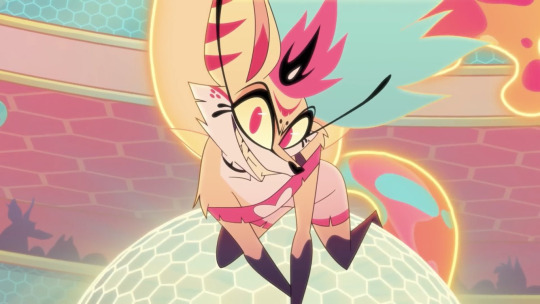
Gluttony's etymology originates from the Latin word gluttire meaning "to gulp." This is to emphasize how someone can over-indulge in food and drink.
While gluttony's base definition focuses on the act of overeating and overdrinking, it is also important to note how people overeat and overdrink.
Many church leaders dating back to the Middle Ages have expanded on gluttony in one way or another. But the most popular interpretation comes from St. Thomas Aquinas's Summa Theologica. He goes over 5 different ways that gluttony can tempt us!
Laute – eating food that is too luxurious, exotic, or costly
Studiose – eating food that is excessive in quality (too daintily or elaborately prepared)
Nimis – eating food that is excessive in quantity (too much)
Praepropere – eating hastily (too soon or at an inappropriate time)
Ardenter – eating greedily (too eagerly)
The fact that there are at least 5 different ways gluttony can be interpreted is already incredible enough.
But it is also important to note that the first 3 ways focus more on the eating of food while the last 2 focus more on the speed in which food is consumed. Also, the food in question doesn't just refer to quantity, but quality of food can be seen as gluttonous too!
So, with that out of the way, how does this all relate back to Queen Bee?
⚠ SPOILERS FOR HELLUVA BOSS SEASON 1 EPISODE 8 ⚠

Throughout both the song "Cotton Candy" and the majority of the party itself, she encourages her guests to eat and drink to their heart's content.
Whether that be enlarging their food, offering giant kegs, or raining candy down on the guests, there is no doubt to anyone that she is encouraging gluttony from her guests. (At least, in the party-girl hedonistic approach and not to feed one's sadness like in the case of Blitzo).
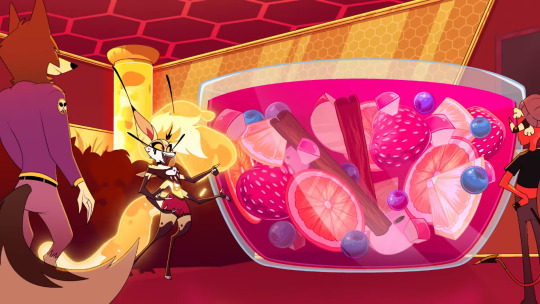
Since excessive food and drink can often make a person feel good, I like the idea of an extroverted party-girl representing gluttony. And she is a fun character with both her performance and making sure her guests are well entertained and taken care of. It's honestly a refreshing take on the deadly sin.
The main point here: you do not have to be fat to be gluttonous.
As long as you have the core concepts of inspiring gluttony, I think that's all that really matters in the end, and Queen Bee knocks it out of the park.
And lastly, while this might be a headcanon more than anything else, I bet all of that dancing and flying is amazing exercise.
If she is putting that much effort into her performances and parties, she must be moving around a ton to organize, rehearse, and interact with everyone. So, if people out there really need a reason to why she is not fat, that's just my thought.
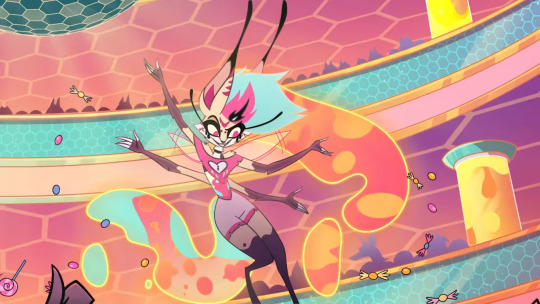
Anyways, thank you for coming to my Ted Talk. I honestly just wanted to rant to get it out of my system.
Feel free to let me know your thoughts! I'm sure there is probably more about the topic that could be covered by others but I just wanted to rant about my perception of it all. Thank you!
#helluva boss#helluva boss queen bee#helluva boss beelzebub#viviziepop#vivienne medrano#hb spoilers#helluva boss episode 8#seven deadly sins#gluttony#lilith saga rants#thank you for coming to my ted talk#twitter drama doesn't usually get me this fired up#kesha did great btw#i hope we can see more of her in the future
242 notes
·
View notes
Photo
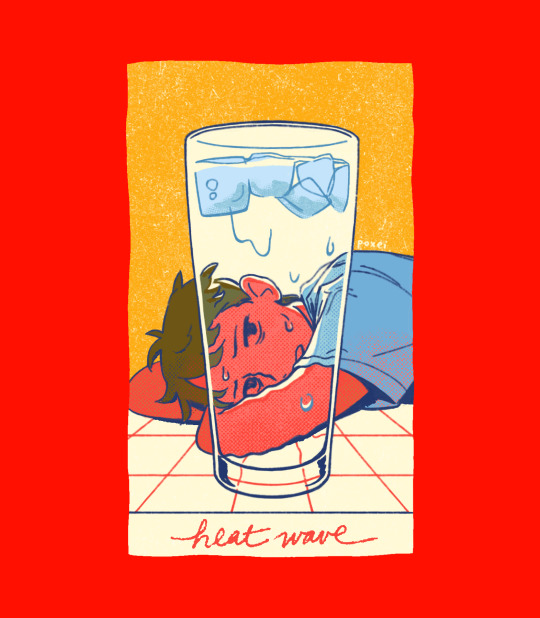
suffering in this heat wave
twitter | ig | store
#people on twitter seemed to think that#i was talking about the european heat wave#when i drew this i had no idea there was gonna be a heat wave#it's just my oc avery suffering#im not even european#sorry about that tho @ europeans#oc#my stuff#artists on tumblr#original art#also come find me at crunchyroll expo#this sticker will be a prize for a stamp rally!#eleventh hour diner
1K notes
·
View notes
Text
Me sharing this first on Twitter and then walking over to Tumblr to post.......
POV...your friend who you're in love with gets a star sapphire ring after saving you...
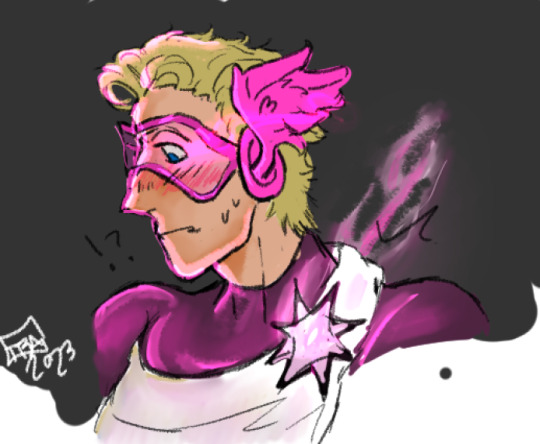
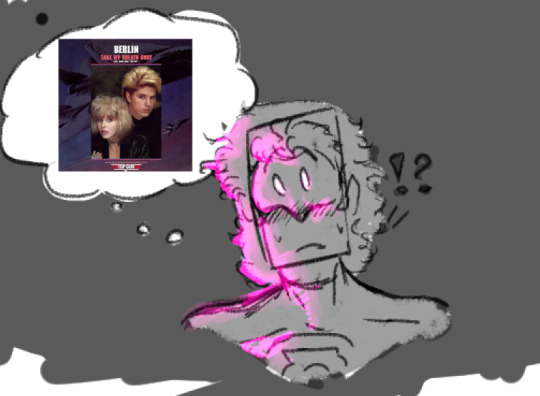
literally....literally swooning. Hal, he LITERALLY swept you off your feet in battle...

#loml hal jordan#thinking about Star Sapphire Barry#is there a fic on him getting a star sapphire ring#carol actually supports the gays and is one themself...she is PROUD and the reason of Barry getting that ring hear me out#speedster ramble#barry allen#hal jordan#YES YOU HEARD THAT RIGHT FOLKS USER FLASHDOESAHUNDREDYARDDASH UPLOADS AND IS ALIVE!#I come back and#my first post is halbarry#my art#dc#me posting more on twitter but dw ill be on here and everywhere#naturally hal just has sappy love songs in her head the minute Barry transforms into a Star Sapphire#green lantern#the flash#I LOVE USING CLIP STUDIO OMMMGGG MY FAVORITE DRAWING APP#also conversations I have on twitter are pleasant#even though I talk about random things#halbarry
213 notes
·
View notes
Text
Not to be dramatic but since hiori is blasian in canon I need black x readers asap🗣️ like we are DEF not getting any cultural background on this kid (because they just slid it in there like we weren’t gonna recognize in the first place)not that we have any background on any of these children’s parents but I think he should explain how he feels being mixed in Japan because it’s just really funny having these two in the exact same anime, and they are both black 
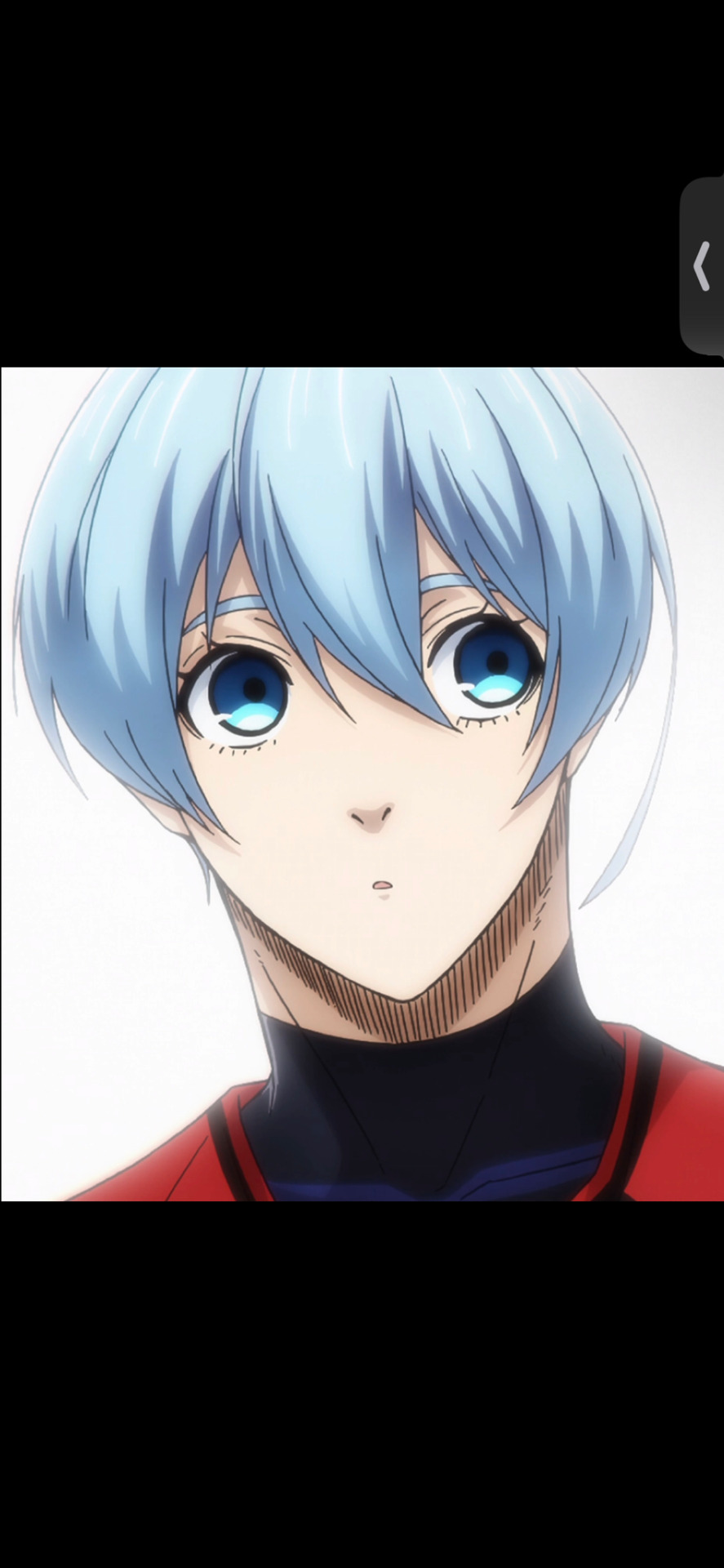

This is ABSOLUTELY hilarious 😭
Edit: so I’ve noticed a pattern of EVERY character looking like their mother and barely sharing any resemblance to their fathers so ig he gets a pass for being pale BUT there’s even more melaninated characters so let’s give him some sun too!!🥺



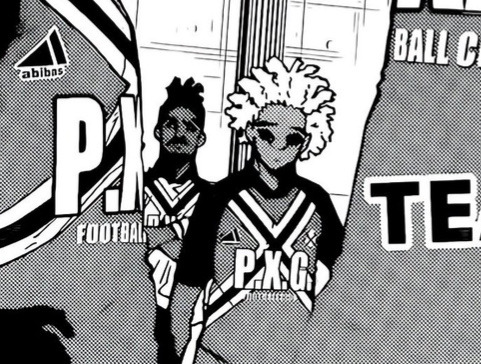
Respectfully; come the fuck on
#blue lock#hiori yo#blue lock hiori#bllk hiori#hiori x reader#blue lock x reader#like I’m most likely gonna do some thing myself#but like the fact that I found out from Twitter#I am once again asking if it is a nod to like being white passing#like is he not supposed to look black because of that#he don’t look like his parents where did his dad come from? Did he immigrate to Japan? Is he Afro American ? Is he Nigerian?#like they’re doing so good on representation so far please.#IT HAS TO BE ON PURPOSE#BC LEO OR WHAYEVER HIS NAME IS IS THERE AND SHIDOU AND TYE OTHER BLACK GUY#I’m literally choosing to believe that it’s on purpose#I am reaching for Atoms I’m not grasping at straws!!#he says he feels like he doesn’t belong so does he mean displaced from two cultures or just one?#what about his extended family is he allowed to talk to them since they’re so suffocating?#I feel like this is a very real thing black kids relate to you can’t just give me him and not tell me shit about him.#if I catch up in the manga and I don’t get any more details I’m going to start chewing lava#Filling in the blanks on his backstory on God#does he just know English and Japanese?#He has a very specific dialect of speaking so is it from knowing a different type of language??#aave mixed in???#French is a very prevalent language in Africa. Does he know a little French?#CREOLE??#like please sad backstory aside who the fuck is he!!#does he get to interact with any of the other black characters??#HIM SHIDOU AND LOKI CAN HE BESTIES LIKE COME ON!!#im in so much pain I’m reading ahead of where I am
87 notes
·
View notes
Text
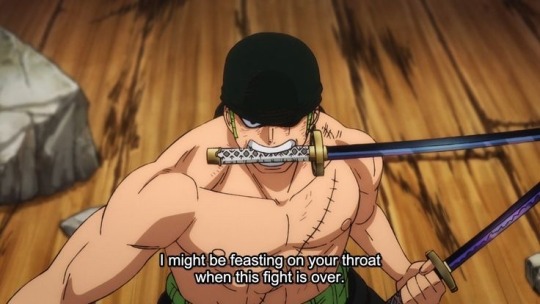
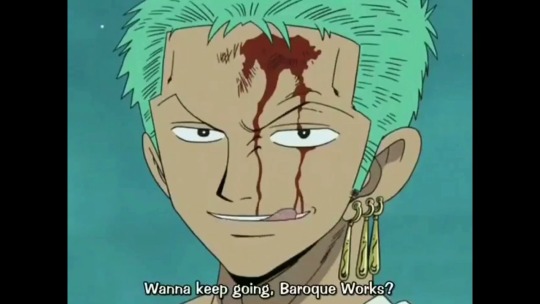
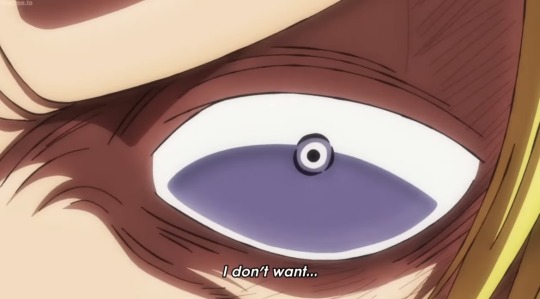

They are vampire and werewolf coded
#but it’s always funny to me that people make sanji a vampire and zoro a werewolf in aus#because zoro licks blood off his face/sword regularly#and talks about ripping out throats#and sanji beings forced to turn into a ’monster’ every full moon against his will writes itself#sanji losing himself every full moon he doesn’t know who he is#come on!!!!#cross posting with my Twitter#zoro#sanji#one piece#jambles#Roronoa zoro#sanzo#zosan
108 notes
·
View notes
Text
I'm gonna be honest, that aimsey response isn't enough for me. It comes off as deflecting rather than taking the responsibility of having a large platform requires. This rhetoric hurts real people, and as usual these days, trans people are always the center of it. I am very tired of pretending that this rhetoric has anything to do with lesbian spaces. It doesn't.
Who benefits from telling other people what they can or cannot identify as? Who benefits from explicit separation of communities? Who benefits from targeting and attacking fellow queer people?
Please think critically for a moment before regurgitating random opinions you find online. You do not know who made those posts.
#anyway#im going to tag this post#if anyone comes across this post#and is confused about terf dog whistles#what they mean and how they spread them#please shoot me an ask or a dm#i promise i dont bite#and i promise to approach your questions with sensitivity and kindness#this is a topic that affects my real life#it is much bigger than minecraft communities#and i want to make sure that the people with genuine intentions understand the harm in this rhetoric#also#i identified as a lesbian since i was 11#i came out as trans at 16#i definitely know what im talking about#aimsey#aimseytv#thoughts of dante#excited to see twitter attempt to villainize this post#if they do theyre intentionally transphobic#know that#discourse
76 notes
·
View notes
Text
this guy i’ve had a crush on for ages recommended i check out the new dnd movie and said that his favorite character reminded him of me so i’m gonna be riding that high for a while
#vasira rambles#don't mind me#i'd share on twitter or ig but alas he follows me there so i'm putting this here#if he does follow my tumblr and i don't know it tho this would be real embarrassing#i just gotta get this outta my head thanks for coming to my ted talk
174 notes
·
View notes
Text
From here on out when making posts about transformers stuff I love I’m not gonna put in a footnote every time about how much other bad stuff there also is in the franchise/fandom. Cause trying to keep posts well rounded and faithful to the entire tf fandom as a whole every single time is so exhausting and also the tf fandom sucks? Additionally it’s too large. Lastly they are nothing to me. They are nothing. Why am I thinking abt the bad parts of fandom all the time when the original goal was to gush about something I really like.
Anyways I love optimus prime he has so much love in his heart
and also autism
hit post
#the tf fandom is incomprehensible#Tumblr is such a subset in and of itself#its different on twitter its different on reddit its barely recognizable on Facebook#at least 50% of it doesn't even exist online#and I'm out here trying to make all my posts approach every angle so that... what? I don't forget to mention that it's riddled with issues?#so that some vengeful anon doesn't come up to me and send an ask berating me on how actually there's a lot of militarism in transformers so#I shouldn't be gushing about how much I love the robot that turns into a gun#^example off the top of my head. this is not in reference to anything#I love talking about nuance in transformers but I also love making silly stupid loving posts about the franchise#and for some reason I've stopped doing the latter#they are both allowed to exist in my mind and on this blog. what is wrong with me#Mac mumbles
61 notes
·
View notes
Text
all max wants to do is race and spend time with his loved ones, the way this angers people is actually quite comical
#twitter (and here tbh) losing their shit over him not caring about a times magazine like#max has made it Very clear many a time that he /jusy/ wants to race and that he’ll stop when it’s no longer fun#so how come you’re so surprised that that is exactly what he’s doing? why do you feel the need to push your expectations onto someone that#doesn’t want them?#perhaps that’s a you problem#me personally; i find it admirable that he has such a strong moral compass in terms of what he wants to do and what his ambitions are#max doesn’t give a single shit about what you think of him yet his name is still forever in your mouth#think about that one :)#max#max verstappen#formula 1#m talks
43 notes
·
View notes
Text
i know i haven't been very active here or on my non-sky account in the first place, but with bisan calling for a strike, i thought it would be worth at least making a post about her message here:
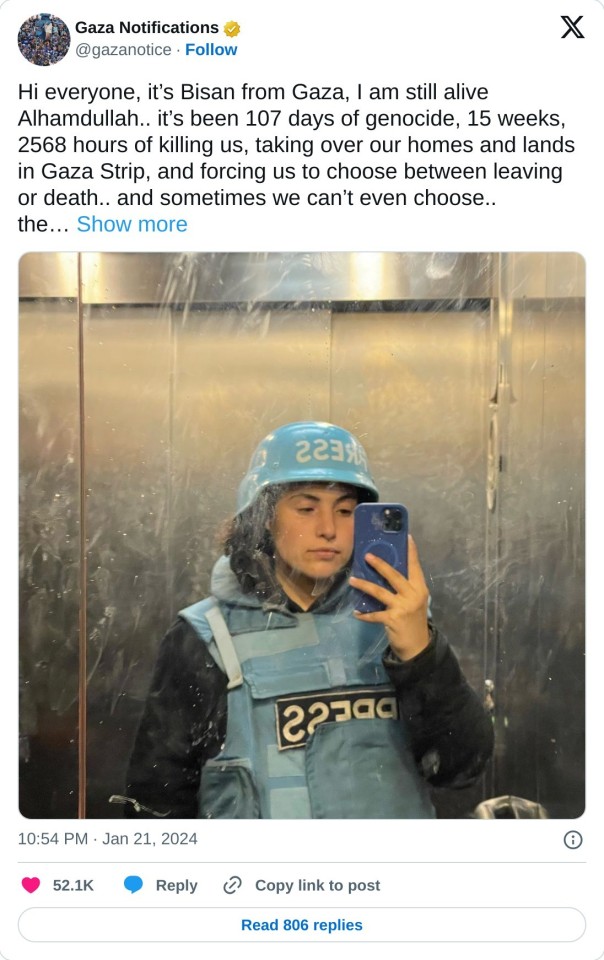
pressure against israel's war crimes and their acts of ethnic cleansing + genocide is building, and there is always a way to contribute to this pressure. let's continue listening to and amplifying palestinian voices!
#there are some info posts and resources on my sideblog but i havent tagged them consistently so i might come back to this a bit later#with links to more information and whatnot because i've been bookmarking a lot of stuff shared through twitter#not just on the past few months but also the treatment of palestinian people for the past few decades#it might take me a while and idk how link limits work or if tumblr might hide my post but ill work something out#sol talks#bullshit will not be tolerated for the record ive already blocked someone and i will block more if necessary
34 notes
·
View notes
Text
I think it's So Funny that Fuuta canonically loves engaging in twitter discourse, has played fantasy/online games (and likely has touched on anime to some degree), and his whole shtick is he likes dishing out judgements on others from the comfort of his own home --
He would have fucking loved the Milgram Project...
#milgram#fuuta kajiyama#gonna catch up on my main blog and queue things in a few days but this was cracking me up all day#all the talk of his thoughts on the state of twitter rn had me thinking#because i suppose i can see yuno getting into it#and maybe mikoto?#but its Exactly the type of thing hed love !#and hed get into discourse arguments about it... addfvg#if the cast (aside from him) remained the same hed be the biggest kotoko defender out there#hed come for the younger characters though ('just because youre young i wont go easy on you' or whatever his thing was)#rose posts#analysis/thoughts
141 notes
·
View notes
Text

i think we as a tumblr society have progressed past the need. blows you guys kisses
#i have simply had enough after last night#some of you have gotten excessively parasocial not just towards me but towards other blogs you come to talk shit about#as if i am not friends or at the very least acquaintances with them#and it's obvious you're from twitter because then i see the same phrasing on a vague tweet#i try to be positive or at the very least constructive about the issues you guys bring to me#but there's a bit too much venting a bit too much infighting i just won't waste my time on#i really wanted to have a normal conversation about how me and that one anon felt about content#and some of you got SO weird SO quickly i was put off. especially waking up this morning to the disaster that was my inbox#it is on me for having encouraged that type of behaviour at some level#so i'm pulling the plug now. go back to twitter and keep vague posting there
21 notes
·
View notes